Report: Director's Duty to Act within Powers (Companies Act 2006)
VerifiedAdded on 2023/01/11
|6
|1179
|46
Report
AI Summary
This report delves into the duties of company directors as outlined in the Companies Act 2006, with a specific focus on Section 171, which mandates directors to act within their powers. The report examines the implications of this section, emphasizing the importance of adhering to the company's constitution and guidelines. It provides examples of breaches, such as exceeding financial authority or issuing shares inappropriately, and explores the concept of acting for proper purposes, highlighting the director's fiduciary role. The report also details the consequences of breaching these duties, including potential compensation, restoration of company property, and derivative actions by shareholders. It concludes by underscoring the significance of clearly defined procedures and policies to ensure directors act lawfully and in the best interest of the company. The report references several legal cases and academic sources to support its analysis.
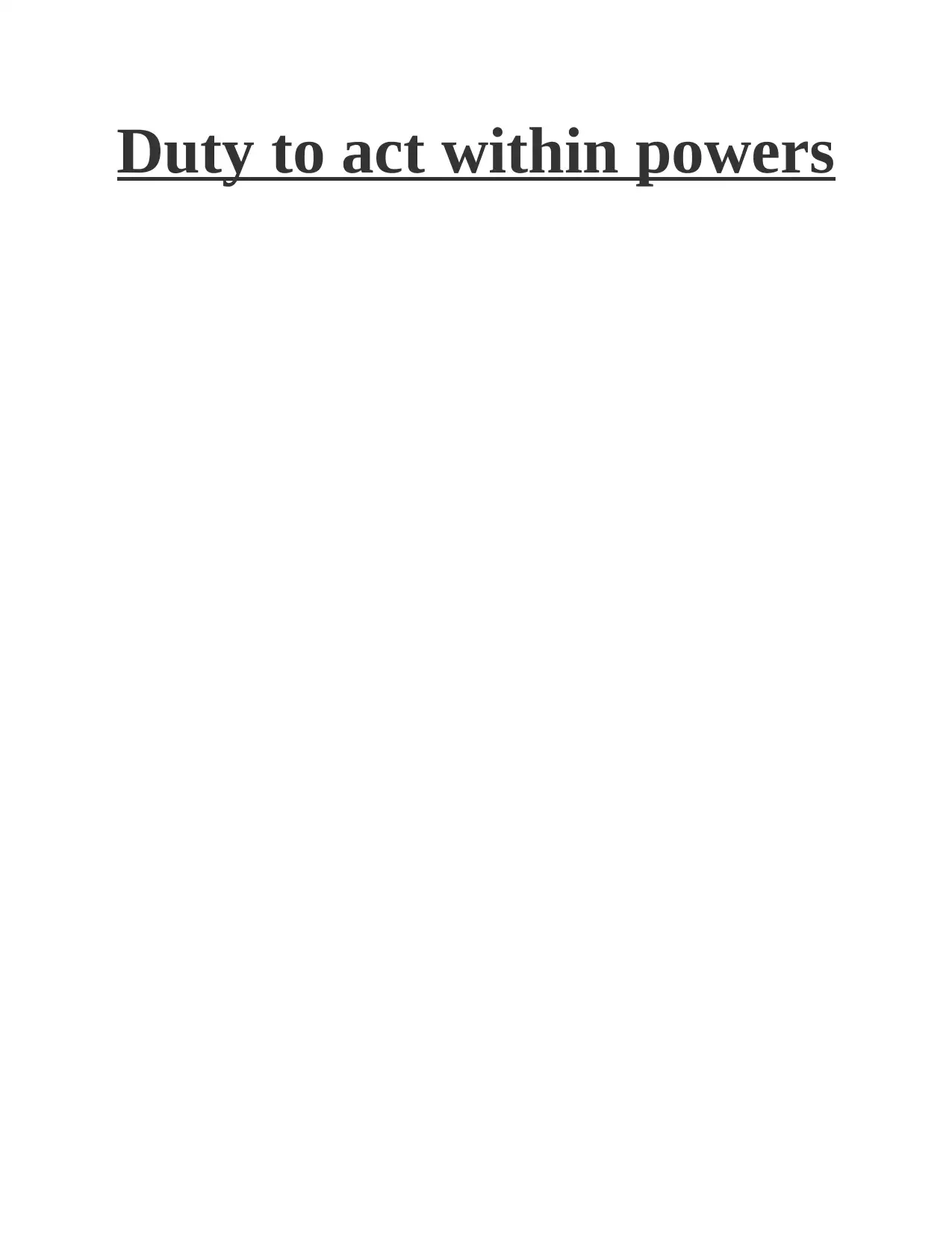
Duty to act within powers
Paraphrase This Document
Need a fresh take? Get an instant paraphrase of this document with our AI Paraphraser
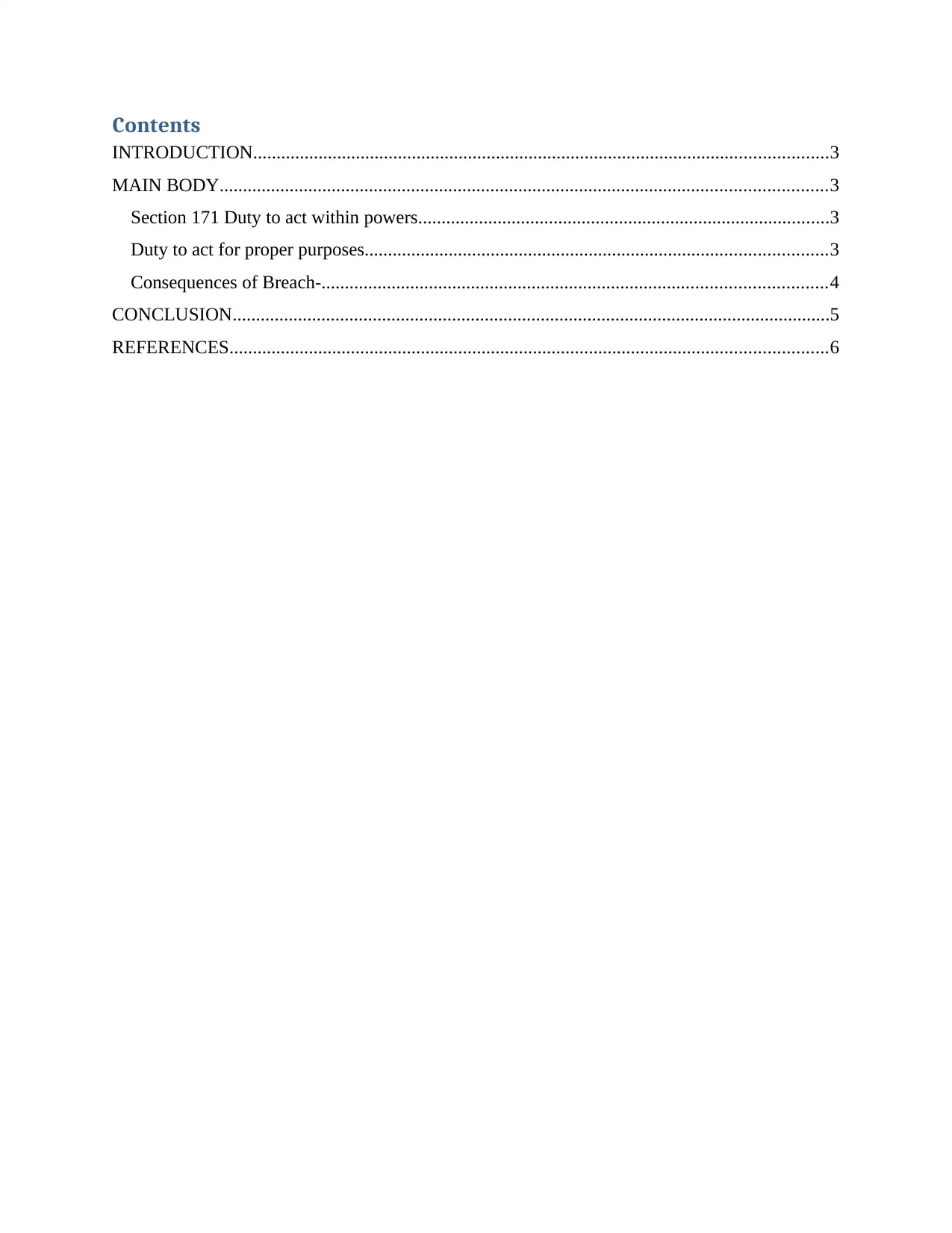
Contents
INTRODUCTION...........................................................................................................................3
MAIN BODY..................................................................................................................................3
Section 171 Duty to act within powers........................................................................................3
Duty to act for proper purposes...................................................................................................3
Consequences of Breach-............................................................................................................4
CONCLUSION................................................................................................................................5
REFERENCES................................................................................................................................6
INTRODUCTION...........................................................................................................................3
MAIN BODY..................................................................................................................................3
Section 171 Duty to act within powers........................................................................................3
Duty to act for proper purposes...................................................................................................3
Consequences of Breach-............................................................................................................4
CONCLUSION................................................................................................................................5
REFERENCES................................................................................................................................6
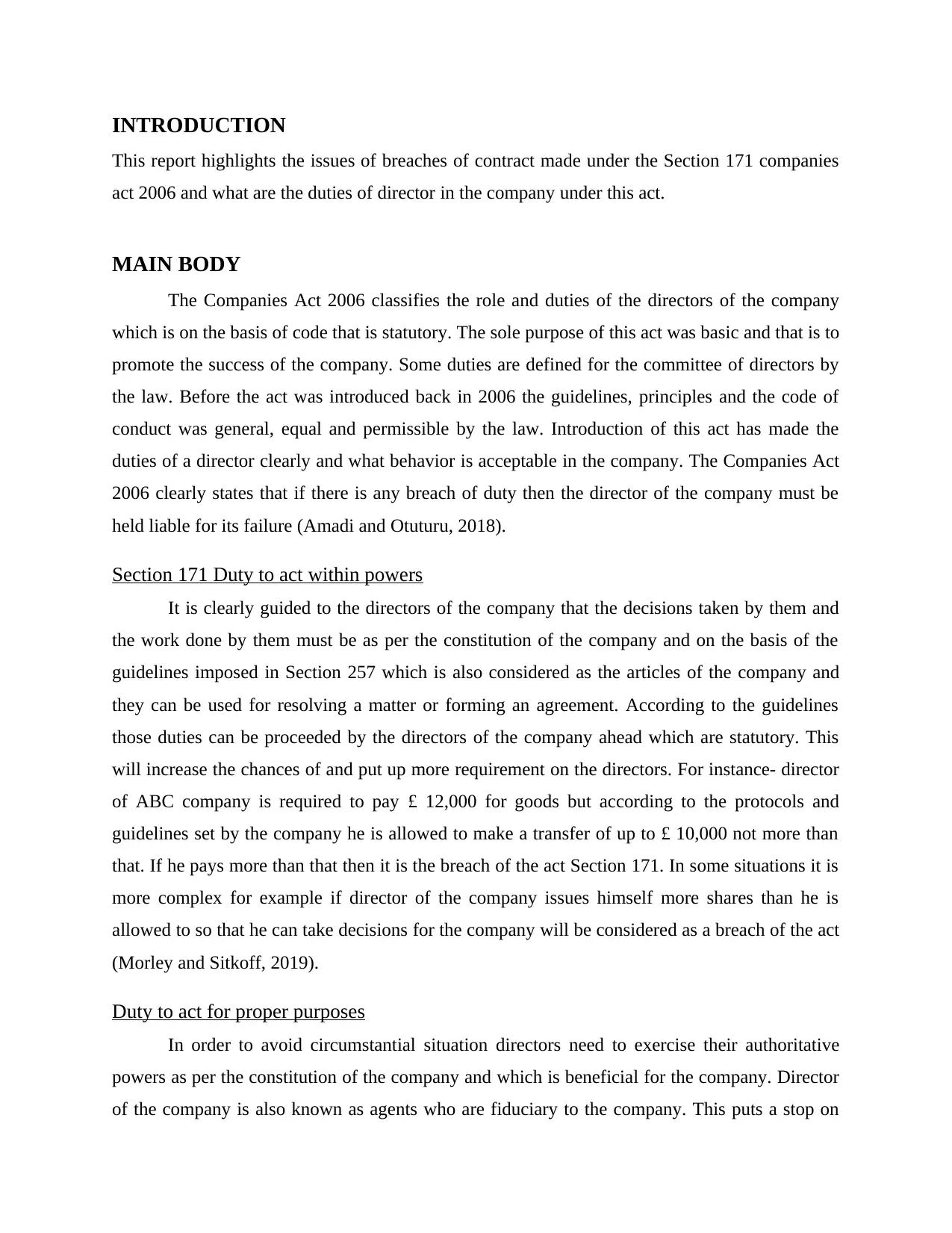
INTRODUCTION
This report highlights the issues of breaches of contract made under the Section 171 companies
act 2006 and what are the duties of director in the company under this act.
MAIN BODY
The Companies Act 2006 classifies the role and duties of the directors of the company
which is on the basis of code that is statutory. The sole purpose of this act was basic and that is to
promote the success of the company. Some duties are defined for the committee of directors by
the law. Before the act was introduced back in 2006 the guidelines, principles and the code of
conduct was general, equal and permissible by the law. Introduction of this act has made the
duties of a director clearly and what behavior is acceptable in the company. The Companies Act
2006 clearly states that if there is any breach of duty then the director of the company must be
held liable for its failure (Amadi and Otuturu, 2018).
Section 171 Duty to act within powers
It is clearly guided to the directors of the company that the decisions taken by them and
the work done by them must be as per the constitution of the company and on the basis of the
guidelines imposed in Section 257 which is also considered as the articles of the company and
they can be used for resolving a matter or forming an agreement. According to the guidelines
those duties can be proceeded by the directors of the company ahead which are statutory. This
will increase the chances of and put up more requirement on the directors. For instance- director
of ABC company is required to pay £ 12,000 for goods but according to the protocols and
guidelines set by the company he is allowed to make a transfer of up to £ 10,000 not more than
that. If he pays more than that then it is the breach of the act Section 171. In some situations it is
more complex for example if director of the company issues himself more shares than he is
allowed to so that he can take decisions for the company will be considered as a breach of the act
(Morley and Sitkoff, 2019).
Duty to act for proper purposes
In order to avoid circumstantial situation directors need to exercise their authoritative
powers as per the constitution of the company and which is beneficial for the company. Director
of the company is also known as agents who are fiduciary to the company. This puts a stop on
This report highlights the issues of breaches of contract made under the Section 171 companies
act 2006 and what are the duties of director in the company under this act.
MAIN BODY
The Companies Act 2006 classifies the role and duties of the directors of the company
which is on the basis of code that is statutory. The sole purpose of this act was basic and that is to
promote the success of the company. Some duties are defined for the committee of directors by
the law. Before the act was introduced back in 2006 the guidelines, principles and the code of
conduct was general, equal and permissible by the law. Introduction of this act has made the
duties of a director clearly and what behavior is acceptable in the company. The Companies Act
2006 clearly states that if there is any breach of duty then the director of the company must be
held liable for its failure (Amadi and Otuturu, 2018).
Section 171 Duty to act within powers
It is clearly guided to the directors of the company that the decisions taken by them and
the work done by them must be as per the constitution of the company and on the basis of the
guidelines imposed in Section 257 which is also considered as the articles of the company and
they can be used for resolving a matter or forming an agreement. According to the guidelines
those duties can be proceeded by the directors of the company ahead which are statutory. This
will increase the chances of and put up more requirement on the directors. For instance- director
of ABC company is required to pay £ 12,000 for goods but according to the protocols and
guidelines set by the company he is allowed to make a transfer of up to £ 10,000 not more than
that. If he pays more than that then it is the breach of the act Section 171. In some situations it is
more complex for example if director of the company issues himself more shares than he is
allowed to so that he can take decisions for the company will be considered as a breach of the act
(Morley and Sitkoff, 2019).
Duty to act for proper purposes
In order to avoid circumstantial situation directors need to exercise their authoritative
powers as per the constitution of the company and which is beneficial for the company. Director
of the company is also known as agents who are fiduciary to the company. This puts a stop on
⊘ This is a preview!⊘
Do you want full access?
Subscribe today to unlock all pages.

Trusted by 1+ million students worldwide
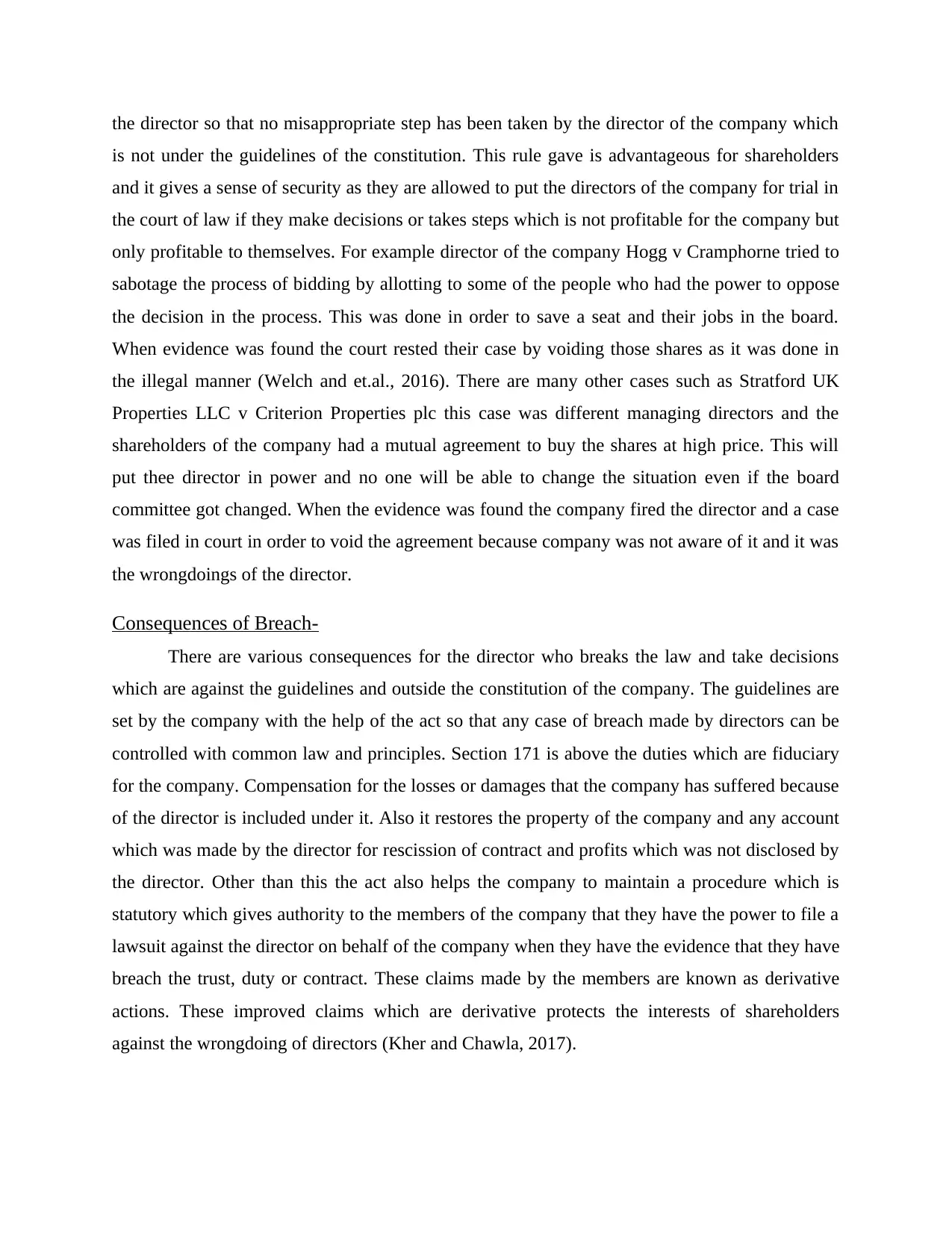
the director so that no misappropriate step has been taken by the director of the company which
is not under the guidelines of the constitution. This rule gave is advantageous for shareholders
and it gives a sense of security as they are allowed to put the directors of the company for trial in
the court of law if they make decisions or takes steps which is not profitable for the company but
only profitable to themselves. For example director of the company Hogg v Cramphorne tried to
sabotage the process of bidding by allotting to some of the people who had the power to oppose
the decision in the process. This was done in order to save a seat and their jobs in the board.
When evidence was found the court rested their case by voiding those shares as it was done in
the illegal manner (Welch and et.al., 2016). There are many other cases such as Stratford UK
Properties LLC v Criterion Properties plc this case was different managing directors and the
shareholders of the company had a mutual agreement to buy the shares at high price. This will
put thee director in power and no one will be able to change the situation even if the board
committee got changed. When the evidence was found the company fired the director and a case
was filed in court in order to void the agreement because company was not aware of it and it was
the wrongdoings of the director.
Consequences of Breach-
There are various consequences for the director who breaks the law and take decisions
which are against the guidelines and outside the constitution of the company. The guidelines are
set by the company with the help of the act so that any case of breach made by directors can be
controlled with common law and principles. Section 171 is above the duties which are fiduciary
for the company. Compensation for the losses or damages that the company has suffered because
of the director is included under it. Also it restores the property of the company and any account
which was made by the director for rescission of contract and profits which was not disclosed by
the director. Other than this the act also helps the company to maintain a procedure which is
statutory which gives authority to the members of the company that they have the power to file a
lawsuit against the director on behalf of the company when they have the evidence that they have
breach the trust, duty or contract. These claims made by the members are known as derivative
actions. These improved claims which are derivative protects the interests of shareholders
against the wrongdoing of directors (Kher and Chawla, 2017).
is not under the guidelines of the constitution. This rule gave is advantageous for shareholders
and it gives a sense of security as they are allowed to put the directors of the company for trial in
the court of law if they make decisions or takes steps which is not profitable for the company but
only profitable to themselves. For example director of the company Hogg v Cramphorne tried to
sabotage the process of bidding by allotting to some of the people who had the power to oppose
the decision in the process. This was done in order to save a seat and their jobs in the board.
When evidence was found the court rested their case by voiding those shares as it was done in
the illegal manner (Welch and et.al., 2016). There are many other cases such as Stratford UK
Properties LLC v Criterion Properties plc this case was different managing directors and the
shareholders of the company had a mutual agreement to buy the shares at high price. This will
put thee director in power and no one will be able to change the situation even if the board
committee got changed. When the evidence was found the company fired the director and a case
was filed in court in order to void the agreement because company was not aware of it and it was
the wrongdoings of the director.
Consequences of Breach-
There are various consequences for the director who breaks the law and take decisions
which are against the guidelines and outside the constitution of the company. The guidelines are
set by the company with the help of the act so that any case of breach made by directors can be
controlled with common law and principles. Section 171 is above the duties which are fiduciary
for the company. Compensation for the losses or damages that the company has suffered because
of the director is included under it. Also it restores the property of the company and any account
which was made by the director for rescission of contract and profits which was not disclosed by
the director. Other than this the act also helps the company to maintain a procedure which is
statutory which gives authority to the members of the company that they have the power to file a
lawsuit against the director on behalf of the company when they have the evidence that they have
breach the trust, duty or contract. These claims made by the members are known as derivative
actions. These improved claims which are derivative protects the interests of shareholders
against the wrongdoing of directors (Kher and Chawla, 2017).
Paraphrase This Document
Need a fresh take? Get an instant paraphrase of this document with our AI Paraphraser
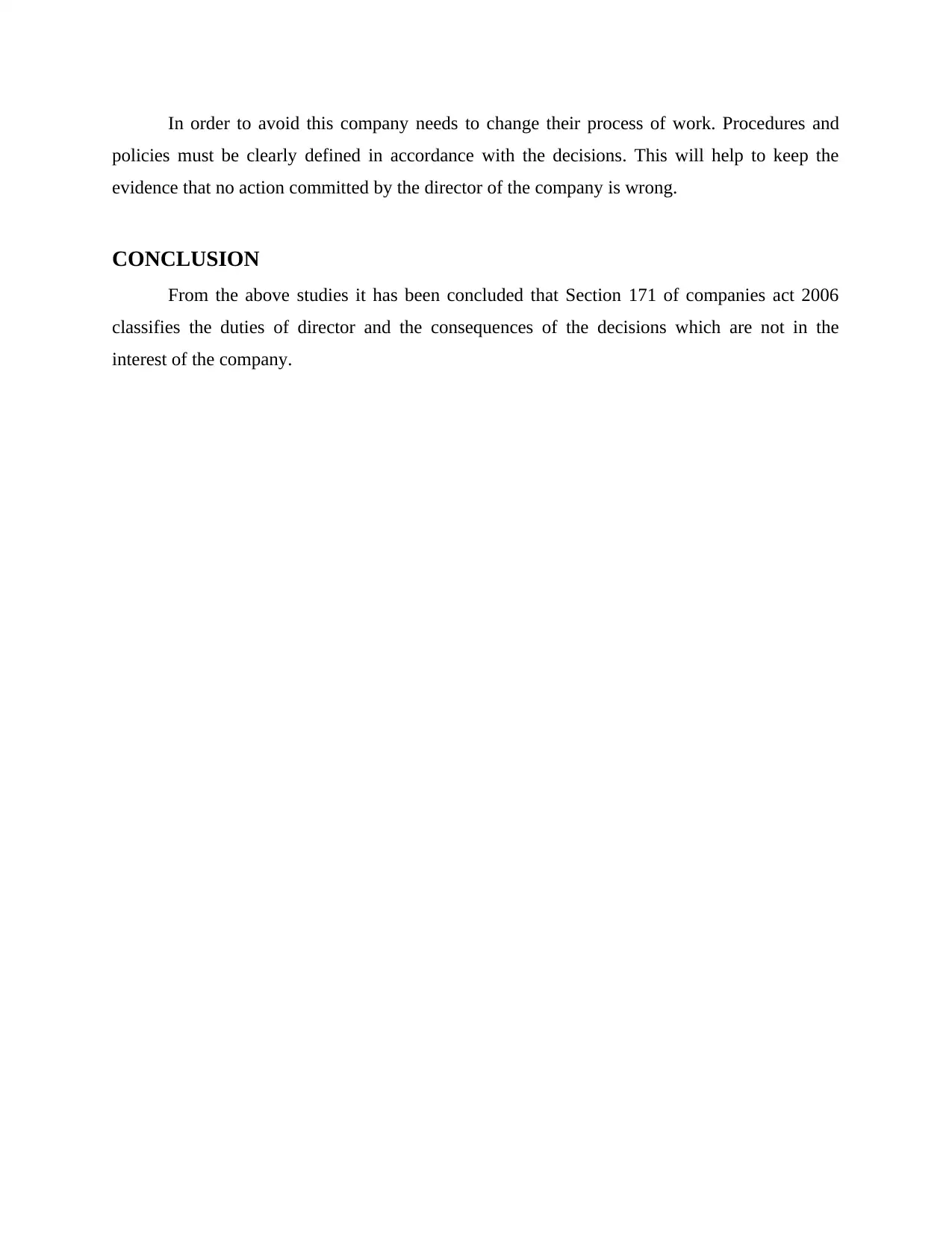
In order to avoid this company needs to change their process of work. Procedures and
policies must be clearly defined in accordance with the decisions. This will help to keep the
evidence that no action committed by the director of the company is wrong.
CONCLUSION
From the above studies it has been concluded that Section 171 of companies act 2006
classifies the duties of director and the consequences of the decisions which are not in the
interest of the company.
policies must be clearly defined in accordance with the decisions. This will help to keep the
evidence that no action committed by the director of the company is wrong.
CONCLUSION
From the above studies it has been concluded that Section 171 of companies act 2006
classifies the duties of director and the consequences of the decisions which are not in the
interest of the company.
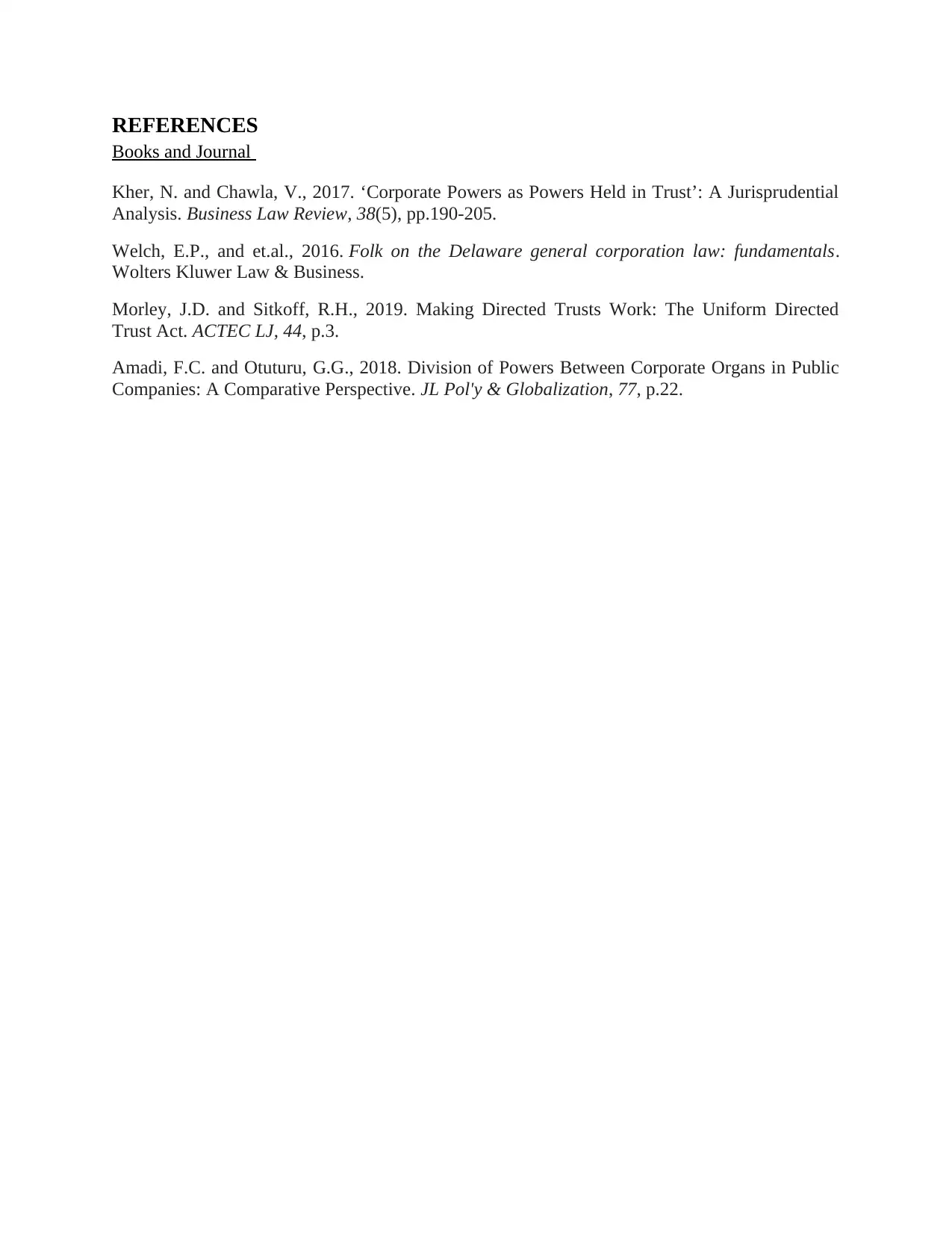
REFERENCES
Books and Journal
Kher, N. and Chawla, V., 2017. ‘Corporate Powers as Powers Held in Trust’: A Jurisprudential
Analysis. Business Law Review, 38(5), pp.190-205.
Welch, E.P., and et.al., 2016. Folk on the Delaware general corporation law: fundamentals.
Wolters Kluwer Law & Business.
Morley, J.D. and Sitkoff, R.H., 2019. Making Directed Trusts Work: The Uniform Directed
Trust Act. ACTEC LJ, 44, p.3.
Amadi, F.C. and Otuturu, G.G., 2018. Division of Powers Between Corporate Organs in Public
Companies: A Comparative Perspective. JL Pol'y & Globalization, 77, p.22.
Books and Journal
Kher, N. and Chawla, V., 2017. ‘Corporate Powers as Powers Held in Trust’: A Jurisprudential
Analysis. Business Law Review, 38(5), pp.190-205.
Welch, E.P., and et.al., 2016. Folk on the Delaware general corporation law: fundamentals.
Wolters Kluwer Law & Business.
Morley, J.D. and Sitkoff, R.H., 2019. Making Directed Trusts Work: The Uniform Directed
Trust Act. ACTEC LJ, 44, p.3.
Amadi, F.C. and Otuturu, G.G., 2018. Division of Powers Between Corporate Organs in Public
Companies: A Comparative Perspective. JL Pol'y & Globalization, 77, p.22.
⊘ This is a preview!⊘
Do you want full access?
Subscribe today to unlock all pages.

Trusted by 1+ million students worldwide
1 out of 6
Related Documents
Your All-in-One AI-Powered Toolkit for Academic Success.
+13062052269
info@desklib.com
Available 24*7 on WhatsApp / Email
![[object Object]](/_next/static/media/star-bottom.7253800d.svg)
Unlock your academic potential
Copyright © 2020–2025 A2Z Services. All Rights Reserved. Developed and managed by ZUCOL.





